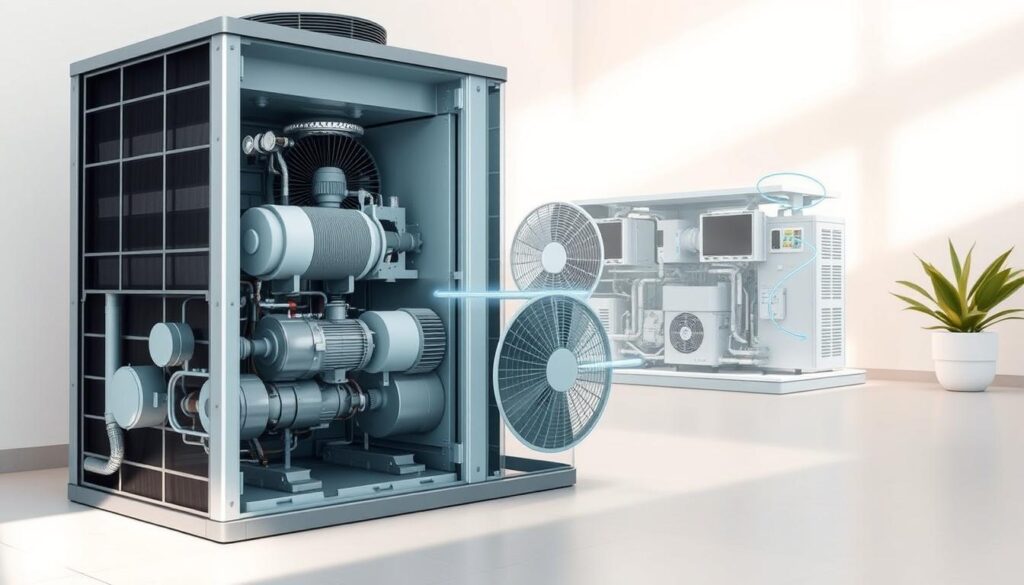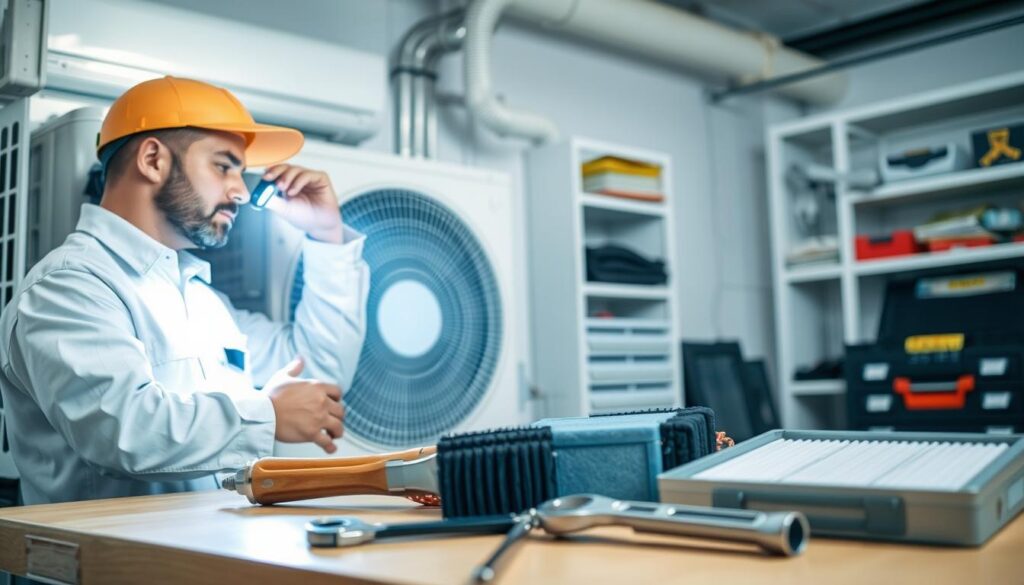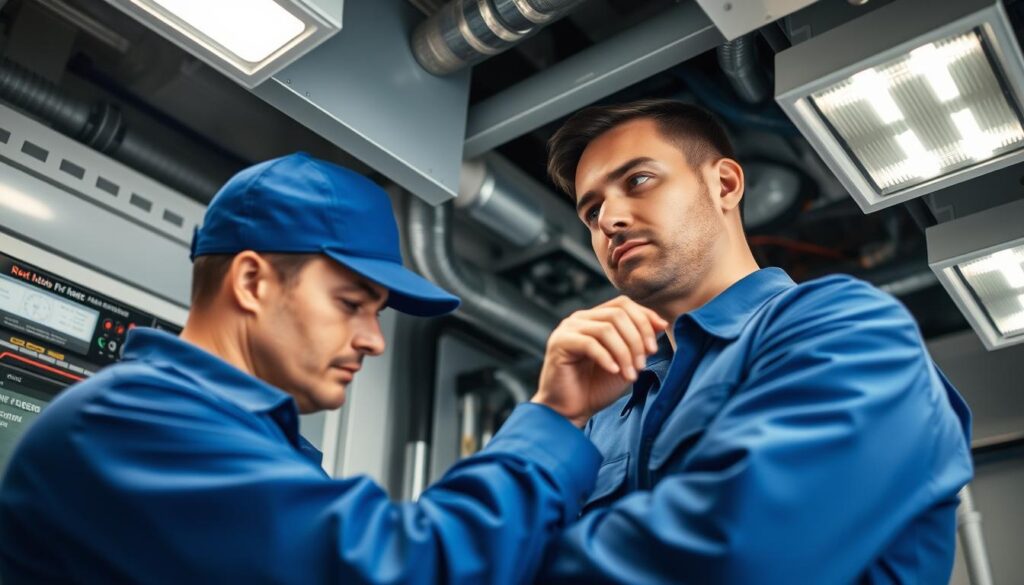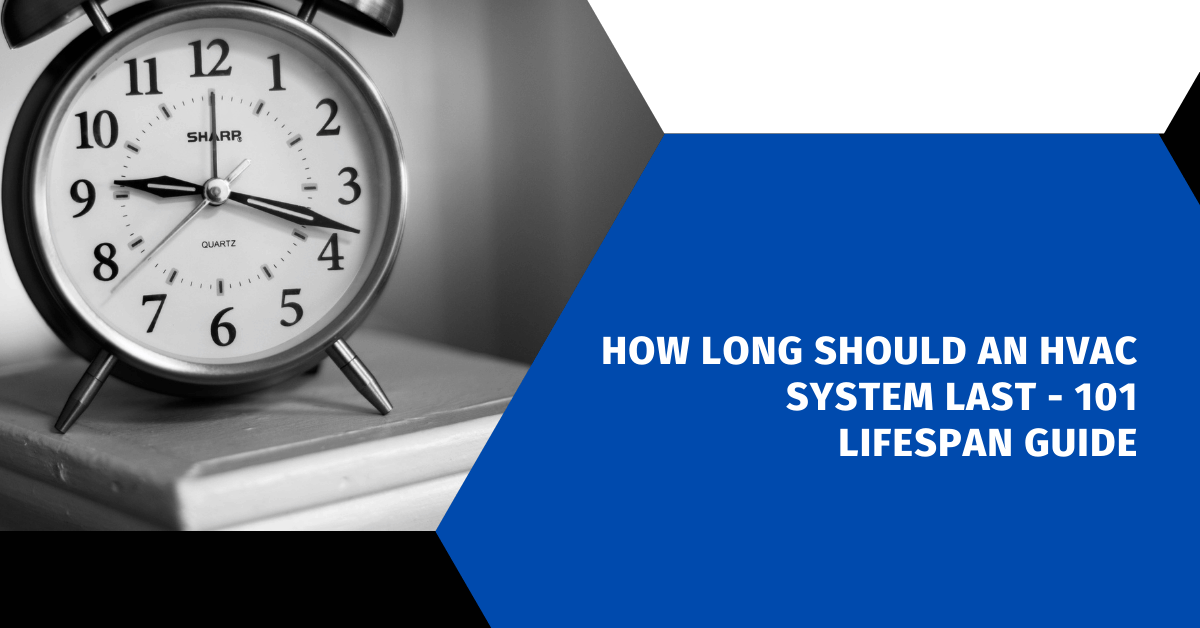Affiliate Disclosure
HVAC Guide Guys is a participant in the Amazon Services LLC Associates Program, an affiliate advertising program designed to provide a means for sites to earn advertising fees by advertising and linking to Amazon.
How Long Should an HVAC System Last? Ever thought about how long your HVAC system will keep your home comfy? Knowing how long an HVAC system lasts is more than just about money. It’s about keeping your home cozy and saving on energy.

Homeowners might be surprised to find out that an HVAC system’s lifespan depends on several key factors. Most systems last between 10 to 25 years. Keeping them well-maintained can help them last longer.
The lifespan of your HVAC system isn’t just about its age. It’s also about how well it works and how efficiently it uses energy. Getting regular check-ups and maintenance from pros can make a big difference. It can help your system last longer and work better.
Key Takeaways
- Average HVAC system lifespan ranges from 10 to 25 years
- Maintenance significantly impacts system durability
- Different HVAC components have varying expected lifespans
- Professional installation reduces efficiency losses
- Regular inspections can prevent premature system failure
Table of Contents
Understanding HVAC System Lifespans: A Comprehensive Overview
Your HVAC system is key to your home’s comfort. Knowing when to replace it and how long it lasts helps you make smart choices. This includes when to do maintenance or upgrade.
Average Lifespan by System Type
Different parts of your HVAC system last for different times. Here’s a quick look at how long they usually last:
- Air Conditioners: 10-15 years
- Furnaces: 15-20 years
- Heat Pumps: 10-15 years
- Boilers: 15-30 years
Factors Affecting System Duration
Several things can change how long your HVAC system lasts:
- Maintenance frequency
- How well it was installed
- Your local environment
- How often you use it
- The quality of the equipment
Importance of Professional Installation
Getting your HVAC installed by pros is very important. They make sure it’s the right size and works well. This can help it last longer.
Quality installation can add years to your HVAC system’s life.
Regular checks and care are key to keeping your HVAC running well. This helps it last longer and work better.
Explore Our HVAC Shop
Looking for top-rated HVAC tools, parts, and accessories? Visit our shop and find the perfect solution for your needs.
Visit the ShopDifferent Types of HVAC Systems and Their Expected Durability
When looking at how long HVAC systems last, you’ll see many types with different lifespans. Knowing how long each system lasts can help you choose the best for your home. This choice affects both your comfort and your investment.
Let’s look at the most common HVAC systems and how long they usually last:
- Central Air Conditioning Systems: Typically last 15-20 years
- Heat Pumps: Average lifespan of 10-15 years, potentially extending to 25 years with excellent maintenance
- Ductless Mini-Split Systems: Impressive durability ranging from 10-30 years
- Gas Furnaces: Can operate effectively for 20-30 years
- Oil Furnaces: Generally last 10-15 years
For commercial HVAC systems, the lifespan is a bit different. These systems work harder, which can shorten their life. How well they’re maintained, installed, and the environment they’re in all affect their lifespan.
Geothermal heat pumps are very durable. Their underground loops can last up to 50 years. The heat pump itself usually works well for 25-30 years. This makes them a great choice for those looking for a long-lasting heating and cooling solution.
The key to maximizing your HVAC system’s lifespan is consistent professional maintenance and timely repairs.
Keep in mind, these lifespans are just averages. Your system’s actual lifespan depends on many factors. Regular professional checks can help keep your system running well and last longer.
Explore Our HVAC Shop
Looking for top-rated HVAC tools, parts, and accessories? Visit our shop and find the perfect solution for your needs.
Visit the ShopHow Long Should an HVAC System Last in Various Climate Conditions
Your HVAC system’s lifespan is not just about keeping it clean. It’s also about the weather around your home. Different climates can really affect how long your HVAC system lasts.
Climate is key to keeping your HVAC system running well. Knowing how the weather affects your equipment helps you take better care of it. It can also help you know when it’s time for a new one.
Coastal Area Challenges
Coastal areas are tough on HVAC systems. The salty air makes metals corrode faster, cutting down on how long they last. In these places, air conditioners and heat pumps usually only last 7-12 years, not the usual 15-20.
- Salt exposure accelerates metal degradation
- Increased maintenance frequency is critical
- Protective coatings can extend system life
Desert Climate Impact
Deserts are very hot and dusty, which is hard on HVAC systems. The heat makes them work too hard, which can shorten their life. Ground-source heat pumps do better in these conditions.
- Frequent filter replacements are essential
- Regular professional inspections prevent premature failure
- Consider heat-resistant equipment designs
Humid Environment Effects
Moist climates bring their own set of problems. Too much moisture puts a strain on cooling systems, leading to mold and mechanical issues. Keeping things dry and using dehumidifiers can help.
- Increased risk of mold and mildew
- Higher risk of damage from condensation
- Invest in humidity control mechanisms
Knowing your climate’s specific challenges helps you take steps to protect your HVAC system. This way, you can make it last longer.
Key Factors That Impact HVAC System Longevity
Knowing what affects your HVAC system’s life is key. Its lifespan depends on many factors. These can either make it last longer or shorter.
Several important parts affect how well your system works and how long it lasts:
- Installation Quality: Good installation means less wear and tear
- Maintenance Frequency: Regular check-ups help avoid early failures
- Environmental Conditions: The weather can stress your system
- Usage Patterns: How often you use it affects its parts
The average HVAC system lasts 10 to 25 years. But, how well you care for and use it greatly affects this time.
| Factor | Impact on Longevity |
|---|---|
| Maintenance | Very important – Can add 5-10 years to its life |
| Installation Quality | Bad installation can cut its life by 30-50% |
| Environmental Stress | Severe weather can make it wear out faster |
By knowing these factors, you can help your HVAC system last longer. Regular upkeep, professional setup, and smart use are essential. They help extend your system’s life.
Explore Our HVAC Shop
Looking for top-rated HVAC tools, parts, and accessories? Visit our shop and find the perfect solution for your needs.
Visit the ShopExplore Our HVAC Shop
Looking for top-rated HVAC tools, parts, and accessories? Visit our shop and find the perfect solution for your needs.
Visit the ShopSigns Your HVAC System Needs Replacement
Knowing when your HVAC system needs a replacement can prevent sudden breakdowns and expensive repairs. Spotting the signs of an aging HVAC system helps homeowners make smart choices for their home’s comfort and energy use.
Performance Indicators
Your HVAC system gives clear signs when it’s not working well. Look out for these important warning signs:
- Inconsistent temperatures in your home
- Less airflow from vents
- Frequent on and off cycling
- Strange noises like grinding, squealing, or banging
Age-Related Warning Signs
The time to replace your HVAC system is important as it gets older. HVAC systems usually last 10 to 15 years before they start to decline. Key signs of aging include:
- System is over 10 years old
- More frequent repairs needed
- Higher energy bills despite using it the same amount
- Less cooling or heating efficiency
Cost-Efficiency Concerns
Fixing an old HVAC system can cost too much over time. If you spend over $500 a year on repairs, it’s time to think about replacing it. A new, energy-efficient system can cut your monthly bills by 20-30%, saving you hundreds each year.
Getting a new HVAC system is not just an expense. It’s a smart investment in your home’s comfort and energy efficiency.
Maintenance Tips to Extend Your HVAC System’s Life

Keeping your HVAC system in good shape is key to making it last longer. Regular upkeep can add years to your heating and cooling system. This can save you a lot of money on new equipment costs.
Effective hvac maintenance for extended life involves several key strategies:
- Change air filters every 1-3 months to maintain optimal system performance
- Schedule annual professional inspections before peak heating and cooling seasons
- Keep outdoor units clear of debris and vegetation
- Clean evaporator and condenser coils annually
- Check and seal ductwork to prevent energy loss
Pro tip: Investing just a few hours of maintenance each year can potentially extend your HVAC system’s lifespan by decades.
“Preventive maintenance is always cheaper than system replacement” – HVAC Industry Experts
Specific maintenance tasks that boost system longevity include:
- Inspect electrical connections for signs of wear
- Verify refrigerant levels professionally
- Clean condensate drain lines to prevent water damage
- Use programmable thermostats to reduce system strain
- Ensure proper insulation around ductwork and home
By following these maintenance tips, you’ll make your system last longer. You’ll also see better efficiency and performance.
Energy Efficiency and Modern HVAC Systems
Energy-efficient HVAC systems have changed how we enjoy our homes. They save money and help the environment. Your heating and cooling system is a big investment.
Modern HVAC systems bring big benefits for homeowners. They offer top performance and save money over time. These systems do more than just heat and cool your home.
Latest Technology Advancements
New HVAC technologies are changing how we control our home’s climate. They come with cool features:
- Smart thermostats with AI-driven temperature optimization
- Variable-speed compressor systems
- Zoned heating and cooling capabilities
- Enhanced SEER ratings between 14-26
Cost Savings Over Time
Energy-efficient HVAC systems save you money. They use 20-40% less energy than old systems. This cuts down your utility bills.
The 5,000 rule says it’s cheaper to replace your system when repair costs and age add up to $5,000. New systems work better and save money in the long run.
A strategic HVAC system upgrade can transform your home’s energy efficiency and comfort level.
Your HVAC system can last 15-20 years with regular care. Getting it serviced by pros keeps it running well. This makes your investment worth it.
Explore Our HVAC Shop
Looking for top-rated HVAC tools, parts, and accessories? Visit our shop and find the perfect solution for your needs.
Visit the ShopThe Role of Professional Maintenance in System Lifespan

Professional maintenance is key to keeping your HVAC system running well. It helps your heating and cooling work at their best. Regular checks can add years to your system’s life.
By choosing professional maintenance, you’re looking after a big part of your home. Experts can spot and fix problems early. This saves you from expensive repairs or system failures.
- Comprehensive system inspection
- Cleaning of critical components
- Lubrication of moving parts
- Calibration of electrical systems
- Performance efficiency testing
Studies show that well-maintained HVAC systems can last up to 25 years. This is much longer than systems that are not looked after. Professional maintenance includes:
- Annual professional tune-ups
- Regular filter replacements
- Cleaning of air ducts
- Checking refrigerant levels
- Inspecting electrical connections
The cost of routine maintenance is minimal compared to the cost of replacing your system. Regular check-ups prevent sudden breakdowns. They also make your system more energy-efficient and keep your home comfortable.
Investing in professional maintenance is investing in your HVAC system’s long-term performance and reliability.
Conclusion
Knowing how long your HVAC system should last is key for homeowners. It usually works well for 15 to 25 years. This depends on how well you maintain it, the climate, and its quality when installed.
Regular care can make your system last longer and work better. This means it will keep your home comfortable for years.
When thinking about when to replace your HVAC, remember different parts last different times. Furnaces can last up to 30 years, but air conditioners usually last 10 to 15 years. Keeping up with maintenance, like changing filters and getting yearly checks, can help extend these lifespans.
As your system gets older, watching its efficiency is important. Look out for signs like higher energy bills, uneven temperatures, or needing repairs often. These signs might mean it’s time to think about upgrading to a newer, more efficient system.
Choosing modern, energy-saving HVAC systems can save you money in the long run. Knowing your system’s life cycle and keeping it in good shape helps. It ensures your home stays comfortable and saves you from unexpected costs.

